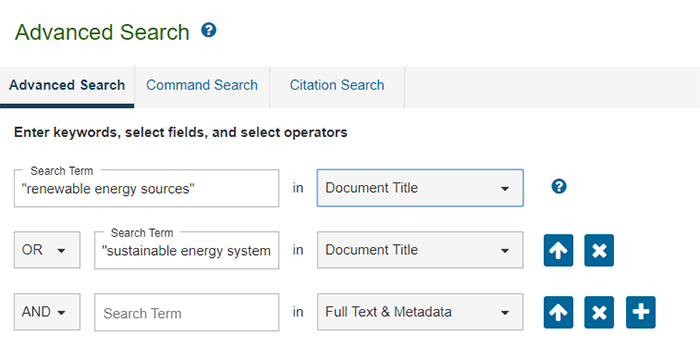Search Examples
Below are search examples using the various IEEE Xplore search functions.
Author Search Examples
Suppose you want to find a conference paper by Plesko about hybrid vehicle technologies. Here are several ways you can perform an author search in IEEE Xplore to find the paper:
Using Structured Advanced Search
- Choose Advanced Search under the Global Search box.
- Construct a search query that searches for Plesko in the Authors field and hybrid vehicle in the Document Title field.
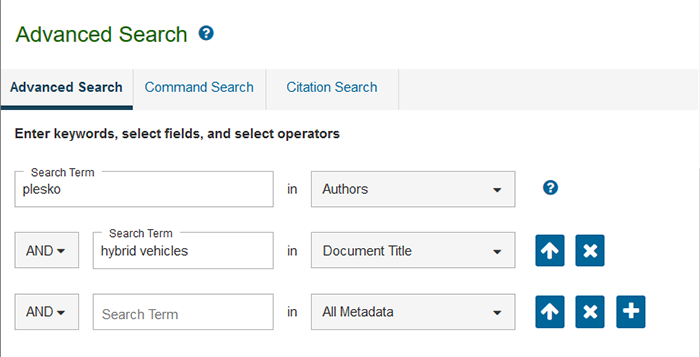
Command Search
- Choose Advanced Search under the Global Search box.
- Choose the Command Search
 tab.
tab. - Construct a free-form search query that searches for Plesko in the Authors field and hybrid vehicles in the Document Title field.
Author Search
- Choose Author Search in the dropdown to the left of the Global Search box.

- Enter Plesko in the Last Name field and select the Search button.
- From the search results page, enter hybrid vehicles into the "Search within results" section of the left pane.
Command Search Examples
Suppose you want to find documents about renewable energy sources.
- Select Advanced Search under the Global Search box.
- Select the Command Search
 tab.
tab. - Enter a search query that searches for renewable energy sources in metadata or full text & metadata:

Note: The query will search full text and metadata automatically if you are signed into an IEEE Account and have specified searching full text and metadata in Preferences. - Suppose you only want documents with this topic in their title. In addition, you are interested in documents with sustainable energy systems in their title. You can look for either topic in the document title by using the OR operator.
Note: You must include the field name in front of each search term or phrase.
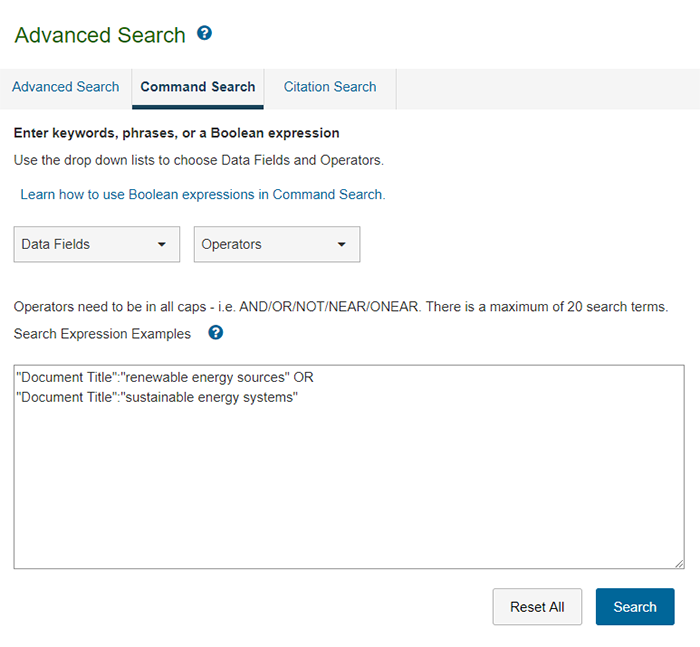
- Suppose further you want these documents to appear only in publications whose titles contain the word power.
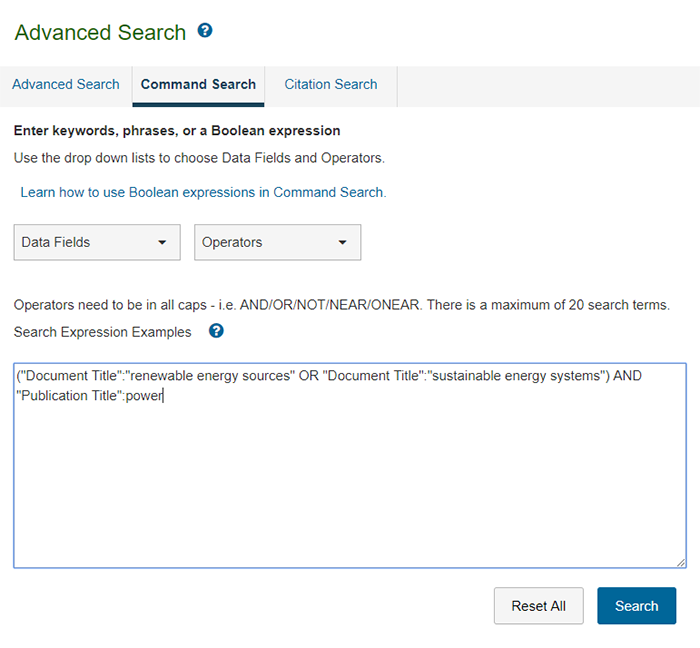
After searching, you can refine the results by Content Type, Publication Year, Author, and other facets. Use parentheses to designate which search expression is executed first. Without parentheses, the default order of precedence is:
- NEAR / ONEAR
- NOT
- AND
- OR
Complex Command Search Examples
In command search, you can specify and perform more complex searches than you can using structured advanced search. You can use many search terms and a variety of search operators, and you can control the order in which to evaluate expressions. Without parentheses, the default order of precedence is:
- NEAR / ONEAR
- NOT
- AND
- OR
Using Logical Operators and Parentheses
You create more complex queries using command search by joining search expressions with logical operators and using parentheses to group and prioritize parts of the query. Although parentheses are not always required, they help you to see the structure of your query more clearly, and may make it easier for you to edit the query.
Here is an example of a more complex query:
(gasoline NOT diesel) AND hybrid electric AND vehicle
This query first looks for documents containing the word gasoline but not the word diesel. It then looks in those documents for the words electric and hybrid either separately or as a phrase, plus the word vehicle, and presents the results. Although the parentheses are not necessary, they make it easier to create and read search expressions.
Here is an example of a more complex query where parentheses are necessary:
(UAV OR "unmanned aerial vehicle") AND ("trajectory tracking" OR "target tracking")
By placing your search terms and operators within parentheses, it designates the order in which they are processed.
Using Proximity Operators
In command search, you have access to two proximity operators, NEAR and ONEAR, which cannot be used in the default advanced search. Here is an example of a complex query using NEAR:
("hybrid electric vehicle" NEAR/10 "plug-in") OR (HEV NEAR/10 "plug-in").
This query looks for documents containing the phrase hybrid electric vehicle or the abbreviation HEV within 10 words of the phrase plug-in. The search terms may occur in any order in metadata.
The ONEAR operator specifies an ordered proximity search:
("hybrid electric vehicle" ONEAR/10 "plug-in") OR (HEV ONEAR/10 "plug-in").
This query also looks for documents containing the phrase hybrid electric vehicle or the abbreviation HEV within 10 words of the phrase plug-in, but hybrid electric vehicle or HEV must occur before (that is, to the left of) plug-in.
Notes:
- Operators must be in all capital letters (AND, OR, NOT, NEAR, ONEAR).
- Wildcards can be used within quotation marks or with the proximity operators (NEAR, ONEAR).
- If a term used with a proximity operator has a non-alphanumeric character such as a hyphen (e.g. plug-in), it should be treated as a phrase and placed within quotation marks. For example, "plug-in".
- You may specify up to 25 search terms (25 terms per search clause). The words within phrases are counted separately so a phrase consisting of three words such as "fiber bragg grating" would count as three search terms.
- Complex Boolean queries can be nested in proximity statements. For example, (computer or PC) NEAR/3 monitor is a valid search.
Structured Advanced Search Examples
Suppose you want to find documents about renewable energy sources.
- Select Advanced Search under the Global Search box.
- You can construct a search query that searches for the phrase renewable energy sources in metadata:
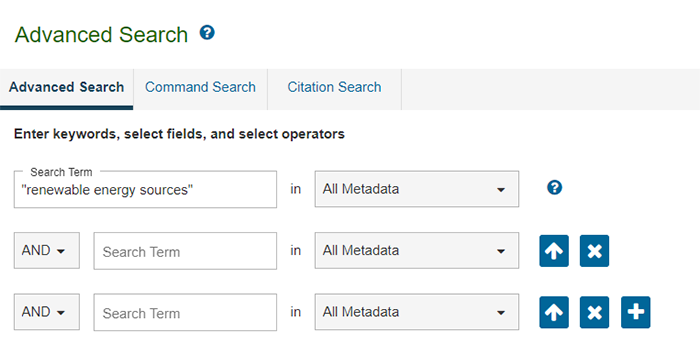
- You can expand this search to a full-text search by selecting Full Text & Metadata:
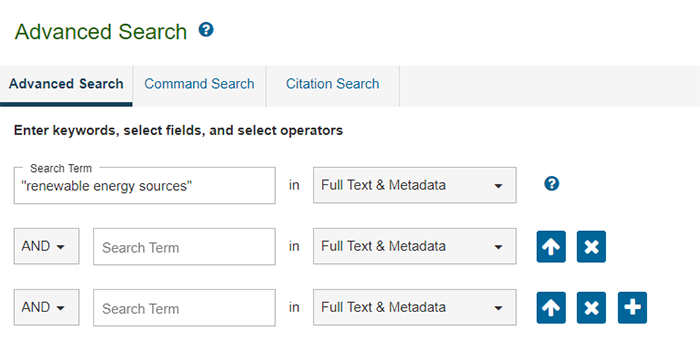
- Suppose you want only documents with this topic in their title. In addition, you are interested in documents with the phrase sustainable energy systems in their title. You can look for either topic in the document title by using the OR operator as follows:
